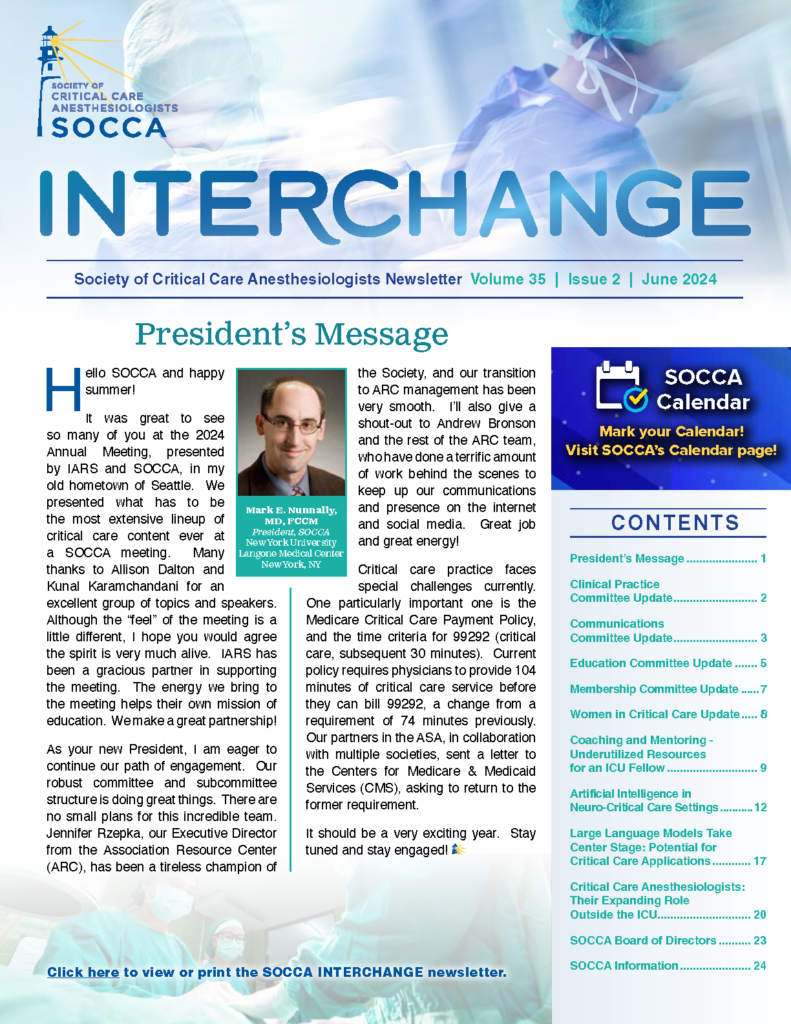Committee on Research: Literature Survey
The Research Committee would like to highlight some of the recent literature contributions of its members. Selected highlights are provided below:
Evaluating Primary Endpoints for COVID-19 Therapeutic Trials to Assess Recovery. https://pubmed.ncbi.nlm.nih.gov/35580040/
Josh Douin, MD, and colleagues compared three different definitions of recovery for hospitalized patients with COVID-19, finding substantial discordance in recovery definitions across clinical trials. They suggest that follow-up times up to 90 days should be employed to assess clinical recovery more accurately.
Microcirculation-guided treatment improves tissue perfusion and hemodynamic coherence in surgical patients with septic shock. https://pubmed.ncbi.nlm.nih.gov/35606577/
Anthanasios Chalkias, MD, and colleagues evaluated a microcirculation-guided treatment algorithm to improve perfusion in surgical patients with septic shock using sublingual assessments via Sidestream DarkField imaging. The novel treatment algorithm was associated with improvement in markers of tissue perfusion.
Challenges and outcomes in airway management outside the operating room. https://pubmed.ncbi.nlm.nih.gov/35102045/
Mary Jarzebowski, MD, and colleagues discuss airway management challenges outside of the operating room environment. Specifically, they highlight the importance of pre-intubation hemodynamic optimization to improve outcomes of this high-risk procedure.
Anxiety, worry, and job satisfaction: effects of COVID-19 care on critical care anesthesiologists. https://pubmed.ncbi.nlm.nih.gov/35025026/
Shahla Siddiqui, MD, led a survey with SOCCA Research Committee members Talia Ben-Jacob, MD, Jarva Chow, MD, and other SOCCA leaders regarding anxiety, worry, and job satisfaction amongst critical care anesthesiologists during the COVID-19 pandemic. Their findings suggest that improved institutional interventions are warranted to support wellness among critical care anesthesiologists and enhance workplace support for female intensivists.
The Incidence, Degree, and Timing of Hypocalcemia From Massive Transfusion: A Retrospective Review. https://pubmed.ncbi.nlm.nih.gov/35308720/
Talia Ben-Jacob, MD, and co-authors evaluated the incidence and timing of hypocalcemia during massive transfusion events. They found that more than 95% of massive transfusion events were accompanied by hypocalcemia within the first 6 hours, suggesting that early calcium supplementation may be warranted as part of a standardized massive transfusion protocol.
Stepwise Ventilator Waveform Assessment to Diagnose Pulmonary Pathophysiology. https://pubmed.ncbi.nlm.nih.gov/35511174/
Brigid Flynn, MD, Aaron Mittel, MD, Haley Miranda, MD, and Vivek Moitra, MD, discuss a stepwise algorithm to diagnose pulmonary pathophysiology and subsequently optimize ventilator management.



































